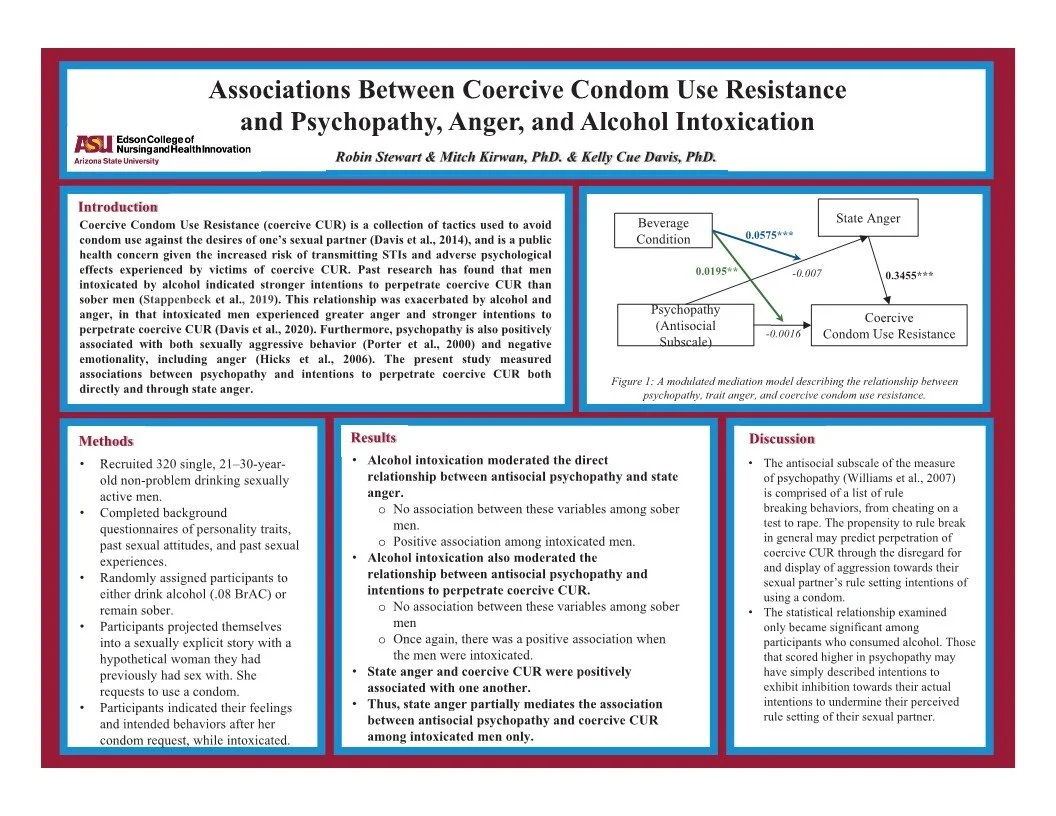Poster #14
Associations between Coercive Condom Use Resistance and Psychopathy, Anger, and Alcohol Intoxication
By: Robin Stewart. Co-authored by Dr. Mitchell Kirwan, Dr. Kelly Cue Davis
Abstract:
Coercive Condom Use Resistance (coercive CUR) is a collection of tactics used to avoid condom use against the desires of one’s sexual partner (Davis et al., 2014), and is a public health concern given the increased risk of transmitting STIs and adverse psychological effects experienced by victims of coercive CUR. Past research has found that men intoxicated by alcohol indicated stronger intentions to perpetrate coercive CUR than sober men (Stappenbeck et al., 2019). This relationship was exacerbated by alcohol and anger, in that intoxicated men experienced greater anger and stronger intentions to perpetrate coercive CUR (Davis et al., 2020). Furthermore, psychopathy is also positively associated with both sexually aggressive behavior (Porter et al., 2000) and negative emotionality, including anger (Hicks et al., 2006). The present study measured associations between psychopathy and intentions to perpetrate coercive CUR both directly and through state anger. Male nonproblem drinkers (N = 321) were recruited for an alcohol administration study examining the effects of alcohol intoxication and psychopathy on coercive CUR intentions using a sexual risk analogue. Through a moderated mediation model, results showed that alcohol intoxication moderated the direct relationship between antisocial psychopathy and anger, such that these two variables were not related among sober men (β = -0.007), but were positively related among intoxicated men (β = 0.0505***). Likewise, alcohol intoxication also moderated the relationship between antisocial psychopathy and intentions to perpetrate coercive CUR such that antisocial psychopathy was positively associated with anger when intoxicated (β = 0.0176***), but not when sober (β = -0.0016). Finally, there was a positive relationship between anger and coercive CUR (β = 0.3455***) indicating partial mediation among intoxicated men only. Future intervention programs seeking to reduce coercive CUR should consider targeting men high in antisocial psychopathy using anger reduction and alcohol use interventions.
robin stewart
Robin Stewart is a graduate of the University of California, Berkeley (UCB), where he received his Bachelor’s (May 2020) degree in psychology. Robin’s ultimate career goal is to become a professor at a research-oriented university.
Robin’s research interests lie in the field of psychopathy and sexual assault perpetration. More specifically, Robin is interested in the categorization and granular elements of psychopathy as a construct and specifically how they contribute to tactics used to obtain sex. Further categorization of these sexual encounters include having sadistic intentions and those involving child sexual abuse.

